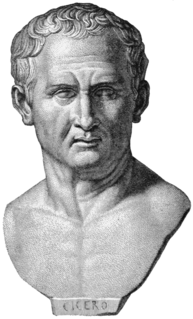See also
- Caelia gens, a plebeian family at Rome
| This disambiguation page lists articles associated with the title Caelius. If an internal link led you here, you may wish to change the link to point directly to the intended article. |
The name Caelius (sometimes spelled Coelius) is an ancient Roman nomen and may refer to:
| This disambiguation page lists articles associated with the title Caelius. If an internal link led you here, you may wish to change the link to point directly to the intended article. |

Lucius Caecilius Firmianus Lactantius was an early Christian author who became an advisor to the first Christian Roman emperor, Constantine I, guiding his religious policy as it developed, and a tutor to his son Crispus. His most important work is the Institutiones Divinae, an apologetic treatise intended to establish the reasonableness and truth of Christianity to pagan critics.

The 1st century BC, also known as the last century BC, started on the first day of 100 BC and ended on the last day of 1 BC. The AD/BC notation does not use a year zero; however, astronomical year numbering does use a zero, as well as a minus sign, so "2 BC" is equal to "year –1". 1st century AD follows.

Classical Latin is the form of Latin language recognized as a standard by writers of the late Roman Republic and early Roman Empire. It was used from 75 BC-3rd century AD when it developed into Late Latin. In some later periods, it was regarded as good or proper Latin, with following versions viewed as debased, degenerate, vulgar, or corrupted. The word Latin is now understood by default to mean "Classical Latin"; for example, modern Latin textbooks almost exclusively teach Classical Latin.

Balbinus was Roman emperor with Pupienus for three months in 238, the Year of the Six Emperors.

Pupienus was Roman emperor with Balbinus for three months in 238, during the Year of the Six Emperors. The sources for this period are scant, and thus knowledge of the emperor is limited. In most contemporary texts Pupienus is referred to by his cognomen "Maximus" rather than by his second nomen Pupienus.
Antonius or Antoníus is a masculine given name of Etruscan origin from the root name Antōnius as well as a surname. Antonius is a Danish, Dutch, Finnish, Latin, Norwegian, and Swedish name used in Greenland, Denmark, Norway, Sweden, Finland, part of the Republic of Karelia, Estonia, Belgium, Netherlands, Suriname, South Africa, Namibia, and Indonesia, while Antoníus is an Icelandic name used in Iceland.
The Caelian Hill is one of the famous seven hills of Rome.

The Sibylline Books were a collection of oracular utterances, set out in Greek hexameters, that, according to tradition, were purchased from a sibyl by the last king of Rome, Tarquinius Superbus, and were consulted at momentous crises through the history of the Republic and the Empire. Only fragments have survived, the rest being lost or deliberately destroyed.
Marcus Caelius Rufus was an orator and politician in the late Roman Republic. He was born into a wealthy equestrian family from Interamnia Praetuttiorum (Teramo), on the central east coast of Italy. He is best known for his trial for public violence in March 56 BC, when Cicero defended him in the extant speech Pro Caelio, and as both recipient and author of some of the best-written letters in the ad Familiares corpus of Cicero's extant correspondence. He may be the Rufus named in the poems of Catullus.
Homo novus or novus homo was the term in ancient Rome for a man who was the first in his family to serve in the Roman Senate or, more specifically, to be elected as consul. When a man entered public life on an unprecedented scale for a high communal office, then the term used was novus civis or "new citizen".
Decimus may refer to:
Gnaeus, also spelled Cnaeus, was a Roman praenomen derived from the Latin naevus, a birthmark. It was a common name borne by many individuals throughout Roman history, including:

The study of Roman sculpture is complicated by its relation to Greek sculpture. Many examples of even the most famous Greek sculptures, such as the Apollo Belvedere and Barberini Faun, are known only from Roman Imperial or Hellenistic "copies". At one time, this imitation was taken by art historians as indicating a narrowness of the Roman artistic imagination, but, in the late 20th century, Roman art began to be reevaluated on its own terms: some impressions of the nature of Greek sculpture may in fact be based on Roman artistry.
Rufus is one of the most common of the ancient Roman cognomina.
Marcus Roscius Coelius was a Roman military officer of the 1st century AD. He was appointed suffect consul for the nundinium March-April AD 81 with Gaius Julius Juvenalis as his colleague.
Lucius Sempronius Atratinus was a Roman politician who was elected suffect consul in 34 BC. He is mentioned in Pro Caelio, a famous speech in defense of Marcus Caelius Rufus by Marcus Tullius Cicero.
Lucius Valerius Messalla Thrasea Priscus was a Roman senator active during the reigns of Commodus and Septimus Severus. He was appointed consul in AD 196 as the colleague of Gaius Domitius Dexter.
The gens Caelia was a plebeian family at ancient Rome. The nomen Caelius is frequently confounded with Coelius and Caecilius, with some individuals referred to as Caelius in manuscripts, while appearing as Coelius or Coilius on coins. Although the Caelii asserted their great antiquity, none of them attained any of the higher offices of the Roman state until the praetorship of Publius Caelius in 74 BC, and the first of this gens who obtained the consulship was Gaius Caelius Rufus in AD 17. The emperor Balbinus was a descendant of the Caelii.

The gens Coelia, occasionally written Coilia, was a plebeian family at ancient Rome. The Coelii are frequently confounded with the Caelii, with some individuals called Caelius in manuscripts, while they appear as Coelius or Coilius on coins. The first of this gens who obtained the consulship was Gaius Coelius Caldus in 94 BC.

Consolatio is a lost philosophical work written by Marcus Tullius Cicero in the year 45 BC. The work had been written to soothe his grief after the death of his daughter, Tullia, which had occurred in February of the same year. Not much is known about the work, although it seems to have been inspired by the Greek philosopher Crantor's ancient work De Luctu, and its structure was probably similar to a series of letter correspondences between Servius Sulpicius Rufus and Cicero.